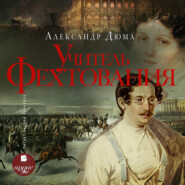По всем вопросам обращайтесь на: info@litportal.ru
(©) 2003-2024.
✖
The Sicilian Bandit
Настройки чтения
Размер шрифта
Высота строк
Поля
With these words the Albanian withdrew, as if he were inviting the captain to follow him.
The captain hesitated for an instant, but he had said too much to draw back; all eyes were turned upon him, and he saw that the least show of timidity would ruin his reputation; and besides, he considered the proposal was a joke.
"Come on," he cried, "for the honour of the ladies and he followed the Albanian.
"Do you know who that young lord disguised as a Greek is?" said the countess, with a trembling voice, and addressing the Prince de Butera.
"No, on my soul, I do not," said he. "Does any one here know him?"
Everybody looked, but no one answered.
"With your permission," said Paolo Tommassi, carrying his hand to his hat; "I know him."
"And who is he, my brave brigadier?"
"Pascal Bruno, my lord," replied Tommassi.
The countess screamed and fainted away; and this incident put a sudden end to the fête.
An hour afterwards, the Prince de Butera had retired to his chamber, and, seated in front of his desk, was arranging some papers, when his major-domo entered.
"What's the matter, Jacomo?" asked the prince.
"I always told you so, my lord," said the major-domo.
"Well, what have you always told me?" asked the prince.
"That your goodness would only encourage him," replied Jacomo.
"Who do you mean?" asked the prince.
"Captain Altavilla," replied Jacomo.
"What has he done?" asked the prince.
"What has he done, my lord?" said Jacomo. "First, your excellency will recollect I apprised you of his regularly putting his silver cover in his pocket."
"Well, go on," said the prince.
"I beg your pardon," said Jacomo; "but your excellency answered, that so long as he only pocketed his own, nothing was to be said."
"I recollect I said so perfectly well," said the prince.
"Well, my lord," said Jacomo, "to-day, it seems that he has not only taken his own, but his neighbours' also, for there are eight missing."
"Ha! that's quite another affair," said the prince; "I must communicate with him on the matter."
He took a sheet of paper, and wrote the following note: —
"Prince Hercules de Butera has the honour of informing Captain Altavilla, that as he no longer dines at home, and being by this fortuitous circumstance deprived of the pleasure of seeing him as previously, he begs he will accept the trifle he sends herewith as a small indemnity for the change this determination must make in his arrangements."
"Stay," continued the prince, giving the major-domo fifty ounces (twenty-six pounds sterling), "take this money, and deliver it and the letter to-morrow to Captain Altavilla."
Jacomo, who knew it was no use speaking after the prince had decided, bowed and left the room. The prince continued quietly arranging his papers when, at the end of about ten minutes, hearing a noise at the door of his room, he raised his head, and saw a man dressed as a Calabrian peasant standing on the threshold, with his hat in one hand and a bundle in the other.
"Who is there?" said the prince.
"I, my lord," replied the peasant.
"And who are you?" asked the prince.
"Pascal Bruno," replied the visitor.
"And what do you come for?" asked the prince.
"First, my lord," said Pascal Bruno, advancing and emptying his hat full of gold on the desk; "first, I have brought you the three hundred ounces you so kindly lent me: they were employed for the purpose I mentioned to you – the inn that was burnt down has been rebuilt."
"Ah, ah! you are a man of your word," said the prince; "well, I am glad of it."
Pascal inclined his head.
"Then," he added, after a short pause, "I have brought you back eight silver covers, with your arms and cypher on them, which I found in the pocket of a certain captain who, most likely, robbed you of them."
"Zounds," said the prince, "it's singular they should be brought back by you; and now, what have you in that bundle?"
"In this bundle," said Bruno, "is the head of a wretch who abused your hospitality, and which I have brought you as a proof of my sworn devotion to your service."
Saying this, Pascal Bruno untied the handkerchief, and taking the head of Captain Altavilla by the hair, he placed it, all bleeding as it was, on the duke's desk.
"What the devil am I to do with such a present as this?" said the prince.
"What you please, my lord," replied Pascal Bruno, who bowed and left the room.
The Prince of Butera remained alone for an instant with his eyes fixed on the head, balancing himself in his arm-chair, and whistling his favourite tune; he then, after an instant, rang the bell, and his major-domo made his appearance.
"Jacomo," said the prince, "it is of no use going to Captain Altavilla's to-morrow morning; tear up the letter; keep the fifty ounces, and throw this carrion on the dung-heap."
CHAPTER VII. – A BRIGAND'S VENGEANCE
At the time of which we are speaking – that is, about the beginning of the year 1804, Sicily was almost in an uncivilised state, from which the return of King Ferdinand and its occupation by the English have partially emancipated it. At the present day, the road which now leads from Palermo to Messina, passing through Taormina and Catana, was not formed, and the only one that existed, we do not say good, but practicable to go from one capital to the other, was that which, passing along the sea-coast, went through Termini and Cephalu; abandoned for its new rival, it is at present scarcely frequented, except by artists in search of the magnificent prospects it discloses at every turn. The only mode of travelling on this road, on which no post was established, was formerly, as at present, on the back of a mule, in a litter carried by two horses, or in your own carriage, relays of horses being sent on before, and placed at every fifteen leagues.
So that the Countess Gemma de Castel Nuovo, when about to leave for Messina, at which place the Prince of Carini had written to her to join him, was obliged to choose one of these three modes. Travelling on a mule was too fatiguing for her, and a journey in a litter, besides the inconveniences of this mode of transport, the principal of which was its slow progress, was apt to produce a feeling like sea-sickness. The countess therefore decided, without any hesitation, in favour of the carriage, and sent forward relays of horses to four stations on the road, that is, to Termini, Cephalu, Saint Agatha, and Melazzo.
Besides these precautions, the courier was ordered to lay in a store of provisions at each of these spots, for the inns are so notoriously deficient in the necessaries of life, that every traveller is advised when he leaves Messina to provide himself for the journey – to purchase cooking utensils, and to hire a cook; to these preparations an experienced Englishman on one occasion added a tent, on account of the deplorable state of the houses of entertainment.
I know not whether it was a learned man, acquainted with ancient Sicily, or a shrewd observer who thoroughly understood modern Sicily, for whom they were at this instant preparing supper at the sign of the Cross, the inn which had been rebuilt with the Prince of Butera's three hundred ounces, and situated on the road from Palermo to Messina, between Ficara and Patti.
The activity of the innkeeper and his wife, who, under the directions of a foreign cook, were at the same time engaged upon fish, flesh, and fowl, proved that the man for whom the culinary apparatus was in requisition was determined not only to have enough, but had no objection to a superfluity.

















